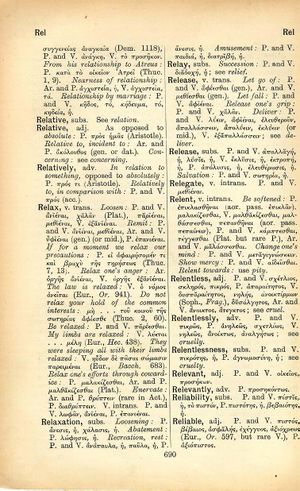relax
Φίλος με βλάπτων (λυπῶν) οὐδὲν ἐχθροῦ διαφέρει → Laedens amicus distat inimico nihil → Ein Freund, der schadet, ist ganz gelich mir einem Feind
English > Greek (Woodhouse)
v. trans.
Loosen: P. and V. ἀνιέναι, χαλᾶν (Plat.), παριέναι, μεθιέναι, V. ἐξανιέναι. Remit: P. and V. ἀνιέναι, μεθιέναι, Ar. and V. ὑφιέναι (gen.) (or mid.), P. ἐπανιέναι. If for moment we relax our precautions: P. εἰ ἀφαιρήσομέν τι καὶ βραχὺ τῆς τηρήσεως (Thuc. 7, 13). Relax one's anger: Ar. ὀργῆς ἀνιέναι, V. ὀργῆς ἐξανιέναι. The law is relaxed: V. ὁ νόμος ἀνεῖται (Eur., Or. 941). Do not relax your hold of the common interests: μὴ . . . τοῦ κοινοῦ τῆς σωτηρίας ἀφίεσθε (Thuc. 2, 60). Be relaxed: P. and V. παρίεσθαι. My limbs are relaxed: V. λύεται . . . μέλη (Eur., Hec. 438). They were sleeping all with their limbs relaxed: V. ηὗδον δὲ πᾶσαι σώμασιν παρειμέναι (Eur., Bacch. 683). Relax one's efforts through cowardice: P. μαλακίζεσθαι, Ar. and P. μαλθακίζεσθαι (Plat.). Enervate: Ar. and P. θρύπτειν (rare in Act.), P. διαθρύπτειν. V. intrans. P. and V. λωφᾶν. ἀνιέναι, P. ἐπανιέναι.

